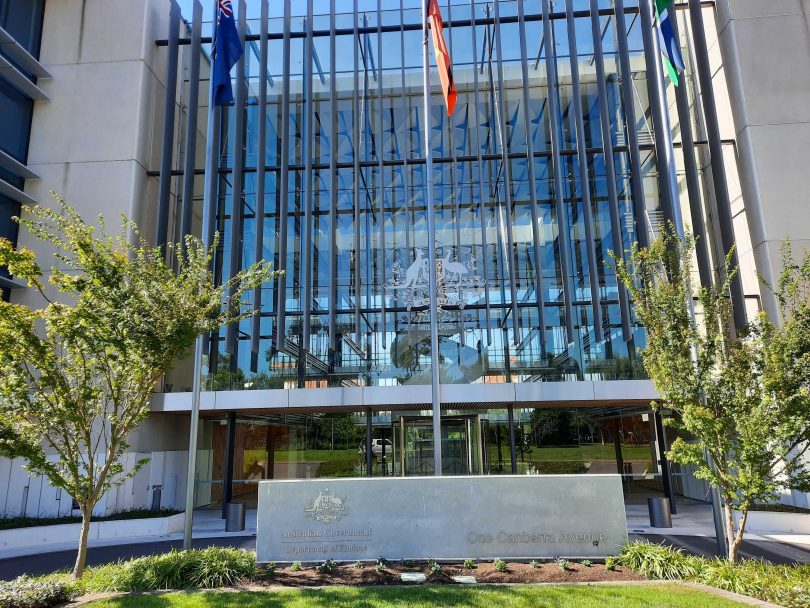
The Department of Finance ran the flawed Streamlining Government Grants Administration (SGGA) Program. Photo: Ian Bushnell.
It was supposed to make the government grants system more efficient, effective and save money. But more than $150 million and nearly a decade later, the Auditor-General has found the Finance Department-run program to establish centralised hubs did none of these.
The 2015-16 Budget allocated $106.8 million over four years for the Streamlining Government Grants Administration (SGGA) Program as part the Federal Government’s APS digital transformation agenda.
SGGA was intended to lead to better policy outcomes, an improved experience for grant applicants and recipients, less red tape, efficiencies for government entities administering grant programs, and improved transparency, plus annual financial savings of about $400 million.
Two hubs were realised – the Business Grants Hub (BGH) and Community Grants Hub (CGH) – but from 2017 concerns were raised about SGGA’s administration costs and whether the program was actually worth the effort.
Between 1 July, 2016 and 9 February, 2021, the 15 entities participating in the SGGA Program published on GrantConnect more than $44.9 billion in funding across 79,651 grants. It represented about 85 per cent of total reported funding and awards.
Since 2013-14, the government has spent $157.8 million to support the SGGA Program and related information and communications technology (ICT) initiatives.
The Auditor-General initiated an audit after recent audits of grants programs found issues with their management through the hubs.
The audit found that despite a strategy being developed to gauge the program’s benefits, performance indicators were not measurable. Nor were there baselines or targets that would clearly demonstrate the achievement of benefits and outcomes.
In successive years Finance sought to cost the program but the results were not used to establish baselines for reporting against the benefits framework.
In 2017 entities were asked about grants administration and what ICT savings had been made. Across 13 entities, savings of less than $1 million were reported and some entities reported no savings at all.
Finance discontinued the costing exercise and planned annual cost efficiencies and savings were not measured and monitored.
A contractor surveyed client entities in 2019 and 2020, but 12 out of 12 and 10 out of 12 respectively reported the hubs had no impact on administration costs or in fact had increased costs.
In 2020, Finance commissioned PwC to assess whether the hubs were more expensive than entities providing their own grants administration services.
Despite client entities having difficulty providing robust cost information, PwC theorised that based on scenarios and estimates provided by the hubs and client entities, the cost of grants administration on average was 29 per cent less for the hubs than for client entities providing their own grants administration.
The audit also found the hubs could not clearly demonstrate their establishment had led to more effective or efficient grants administration.
“Business processes and workflows were established but poor data quality impedes an assessment of whether processes and workflows were followed,” the audit states.
“There are significant data management and quality issues. Client usage of services across the grants lifecycle is uneven. Evaluation services are rarely used. Service standards have been developed but are only reported by CGH. Collaboration with and support of client entities in the grant design and hub usage phases is uneven.”
A key objective of the SGGA Program — to establish a standardised whole-of-government approach to streamline grants administration — has not been achieved, the audit says
The program only delivered one of four core deliverables, the hubs. But the delays dogged the transition of grant programs to the hubs and standardised business processes were not adopted.
The three other core deliverables — a single grants administration process, a data warehouse and market testing — have not been achieved.
The audit found the design and governance of the program was flawed from the beginning, proceeding without a sound evidence base.
“Benefits were presented to government without a reasonable basis for establishing how they would be realised,” the audit found.
“Cost studies completed in 2017 and 2018 highlighted shortcomings in the reliability of the advice to government.”
The Auditor-General made recommendations on performance reporting, a new plan for operating the hubs, and improving the quality of data.
Finance agreed to all three, while the other two agencies involved — Industry, Science, Energy and Resources and Social Services — agreed to a new operating plan.



















